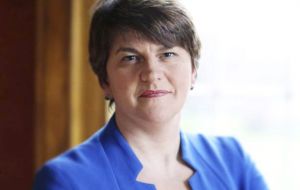MercoPress. South Atlantic News Agency
Challenging path for Ulster ruling alliance, following election results
 First Minister Arlene Foster shared power in an uneasy alliance with their Irish nationalist Sinn Fein opponents, led by party president Gerry Adams.
First Minister Arlene Foster shared power in an uneasy alliance with their Irish nationalist Sinn Fein opponents, led by party president Gerry Adams. The pro-British Democratic Unionist Party (DUP) managed to remain the biggest party with a single seat margin in the Northern Ireland Assembly as the Irish nationalist Sinn Fein closed in on them following March 2 election, according to the latest results announced over the weekend.
The DUP emerged with 28 seats despite suffering a backlash over allegations of financial mismanagement, while Sinn Fein got 27 of 90 seats available at the Stormont Assembly, becoming once more the second-largest party.
Social Democratic and Labour Party (SDLP), the Ulster Unionist Party (UUP), and Alliance Party of Northern Ireland got 12, 10 and 8 seats, respectively, with the rest being shared among the other minor parties and one independent candidate.
With the latest results, the DUP has failed to secure 30 seats that would be required to trigger a petition of concern veto at Stormont, while the SDLP replaced the UUP as the third largest party in the assembly. Mike Nesbitt quit as UUP leader on Friday after poor showing.
Northern Ireland’s Electoral Office disclosed Friday that the turnout was nearly 65%, up nearly 10 percentage points on last year’s poll, bucking the trend of declining voting in many national and European elections in other parts of the EU.
Northern Ireland’s voters went to the polls on Thursday, to return a new local parliament after a power-sharing deal between Irish nationalists and pro-British parties collapsed earlier this year. It was the U.K. region’s second election in 10 months.
In essence, the election is two contests, with Catholics mostly voting for parties which want a united, independent Ireland and Protestant voters largely supporting pro-U.K. unionist parties.
Until a financial scandal over a botched state-backed heating scheme -- which could cost the taxpayers £500 million, the DUP led by First Minister Arlene Foster shared power in an uneasy alliance with their Irish nationalist Sinn Fein opponents, led by party president Gerry Adams.
When Foster’s Sinn Fein deputy withdrew from the local administration, the UK’s Secretary of State for Northern Ireland James Brokenshire was forced to announce a March 2 election.
However, it is unclear if power sharing between local parties will resume after Thursday’s election in the following 3 weeks or if a period of direct rule from London beckons.




Top Comments
Disclaimer & comment rules-

-

Read all commentsPretty important result here. The elections were given virtually no coverage by the BBC. I believe things are indeed heading towards a 'united Ireland'.
Mar 07th, 2017 - 03:27 pm 0Great! Let the Republic sort it out... What BBC do you watch, plenty of news coverage, Newsnight, Daily Politics etc etc. I suppose SNP supporters only watch Braveheart on repeat?
Mar 07th, 2017 - 05:21 pm 0Commenting for this story is now closed.
If you have a Facebook account, become a fan and comment on our Facebook Page!